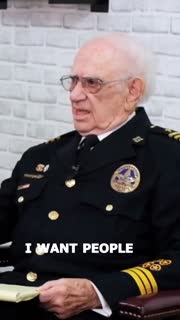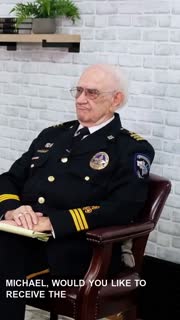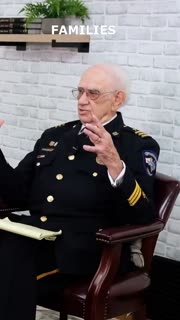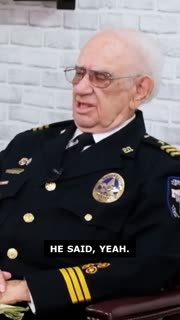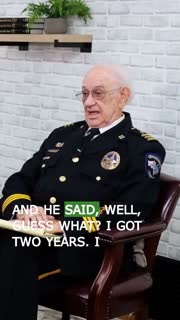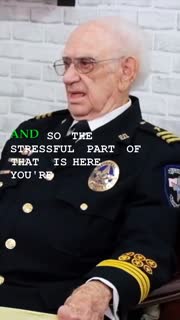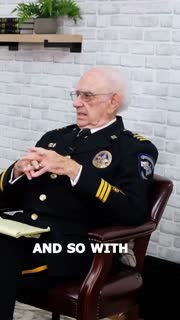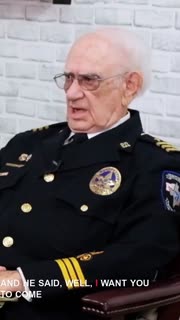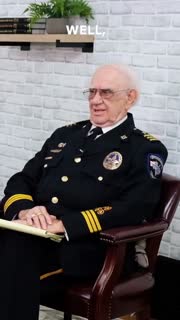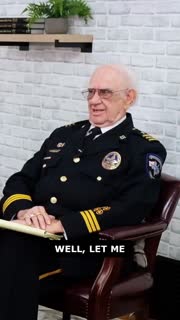Bridging Faith and Service in Law Enforcement
Devotional
Sermon Summary
Bible Study Guide
Sermon Clips
### Quotes for Outreach
1. "I want people out there, you can touch people that nobody else can. Exactly. And you see the worst of the worst. There's things in my memory today that my wife don't even know about. There's no reason to bring that stuff home to her. I've always said, who's got your ear? Who you're listening to, you know, in counseling." [33:07] (57 seconds)
2. "And I said, Michael, would you like to receive the Lord tonight? Now it's 2 o'clock in the morning. He said, yes, sir. And we prayed. And I said, if you need anything, Michael, you call me. I got back in the car and the officer said, well, he's late. And I said, don't touch him. He's got hepatitis." [11:14] (29 seconds)
3. "And I led both of those families to the Lord in the middle of the street at nine o'clock at night. And the crowd just and I had everybody just join hands. And we just prayed. Wonderful. Those are the good things that happen. But there's a lot more bad things than that offset." [15:58] (14 seconds)
4. "And he said, well, can I look in your backpack? He said, yeah. And I opened up the backpack. And there was about a three-pound roast that he had stolen from the grocery store. And it was almost turning black. And I said, well, how are you going to cook this meat? He said, well, there's a roadside park on the other side of town." [09:39] (21 seconds)
5. "And he said, well, guess what? I got two years. I said, you what? I said, that's not right. And he said, well, let me tell you a story. He said, the judge said, I'm not taking that plea bargain. Not for a minute. He said, I'll give you a year. I'm just going to cut that plea bargain in half. And he looked over. And he said, when I grow up, want to be just like you." [13:38] (32 seconds)
### Quotes for Members
1. "And so the stressful part of that is here you're trying, you have a life that's weighing in the balance because of family violence situations. And so I finally called him by name and I said, why don't you just give me the magazine out of that pistol? Because I was really taking a chance at this point because the older semi-automatics, if you took the magazine out, you disabled the gun." [17:18] (37 seconds)
2. "And so with that being said, you think you are prepared for these type of things? Well, we already had the Luby massacre. The Luby massacre in Killeen where the man going in shot twenty-some people, killed them. The Oklahoma blast there where we thought that we had a handle on it. And that's where we found out that dogs, the dogs went into grief syndrome." [24:15] (33 seconds)
3. "And he said, well, I want you to come back. And he was a chain smoker, rough talking. People don't realize how he can be, but he was. And he came back. He was a different guy. And at this time, it was right after Thanksgiving. And he said, and there was a lady that, well, there was a fire dispatcher from Montana. And she wanted to work with me." [27:30] (31 seconds)
4. "And he said, well, let me tell you a story. He said, the judge said, I'm not taking that plea bargain. Not for a minute. He said, I'll give you a year. I'm just going to cut that plea bargain in half. And he looked over. And he said, when I grow up, want to be just like you. I said, you don't have much ambition. But anyway, that's one of the good stories that you have." [13:38] (29 seconds)
5. "And he said, well, let me tell you a story. He said, the judge said, I'm not taking that plea bargain. Not for a minute. He said, I'll give you a year. I'm just going to cut that plea bargain in half. And he looked over. And he said, when I grow up, want to be just like you. I said, you don't have much ambition. But anyway, that's one of the good stories that you have." [13:38] (29 seconds)
Ask a question about this sermon
1. "I want people out there, you can touch people that nobody else can. Exactly. And you see the worst of the worst. There's things in my memory today that my wife don't even know about. There's no reason to bring that stuff home to her. I've always said, who's got your ear? Who you're listening to, you know, in counseling." [33:07] (57 seconds)
2. "And I said, Michael, would you like to receive the Lord tonight? Now it's 2 o'clock in the morning. He said, yes, sir. And we prayed. And I said, if you need anything, Michael, you call me. I got back in the car and the officer said, well, he's late. And I said, don't touch him. He's got hepatitis." [11:14] (29 seconds)
3. "And I led both of those families to the Lord in the middle of the street at nine o'clock at night. And the crowd just and I had everybody just join hands. And we just prayed. Wonderful. Those are the good things that happen. But there's a lot more bad things than that offset." [15:58] (14 seconds)
4. "And he said, well, can I look in your backpack? He said, yeah. And I opened up the backpack. And there was about a three-pound roast that he had stolen from the grocery store. And it was almost turning black. And I said, well, how are you going to cook this meat? He said, well, there's a roadside park on the other side of town." [09:39] (21 seconds)
5. "And he said, well, guess what? I got two years. I said, you what? I said, that's not right. And he said, well, let me tell you a story. He said, the judge said, I'm not taking that plea bargain. Not for a minute. He said, I'll give you a year. I'm just going to cut that plea bargain in half. And he looked over. And he said, when I grow up, want to be just like you." [13:38] (32 seconds)
### Quotes for Members
1. "And so the stressful part of that is here you're trying, you have a life that's weighing in the balance because of family violence situations. And so I finally called him by name and I said, why don't you just give me the magazine out of that pistol? Because I was really taking a chance at this point because the older semi-automatics, if you took the magazine out, you disabled the gun." [17:18] (37 seconds)
2. "And so with that being said, you think you are prepared for these type of things? Well, we already had the Luby massacre. The Luby massacre in Killeen where the man going in shot twenty-some people, killed them. The Oklahoma blast there where we thought that we had a handle on it. And that's where we found out that dogs, the dogs went into grief syndrome." [24:15] (33 seconds)
3. "And he said, well, I want you to come back. And he was a chain smoker, rough talking. People don't realize how he can be, but he was. And he came back. He was a different guy. And at this time, it was right after Thanksgiving. And he said, and there was a lady that, well, there was a fire dispatcher from Montana. And she wanted to work with me." [27:30] (31 seconds)
4. "And he said, well, let me tell you a story. He said, the judge said, I'm not taking that plea bargain. Not for a minute. He said, I'll give you a year. I'm just going to cut that plea bargain in half. And he looked over. And he said, when I grow up, want to be just like you. I said, you don't have much ambition. But anyway, that's one of the good stories that you have." [13:38] (29 seconds)
5. "And he said, well, let me tell you a story. He said, the judge said, I'm not taking that plea bargain. Not for a minute. He said, I'll give you a year. I'm just going to cut that plea bargain in half. And he looked over. And he said, when I grow up, want to be just like you. I said, you don't have much ambition. But anyway, that's one of the good stories that you have." [13:38] (29 seconds)
